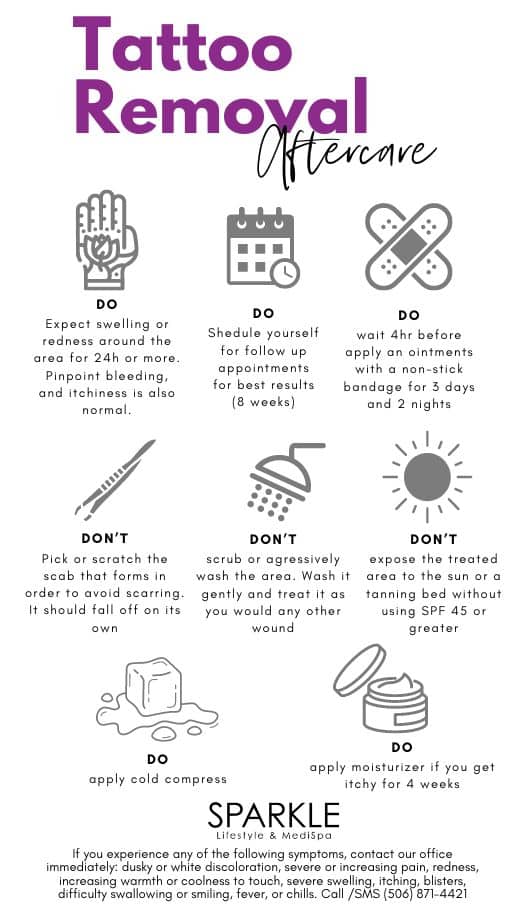Introduction
Undergoing laser tattoo removal with the PicoWay system requires proper aftercare to ensure optimal healing and minimize potential side effects. This guide provides detailed instructions to help you care for your skin after the procedure.
Post-Treatment Care Instructions
Do’s: How to Care for Your Skin
- Keep the Area Clean: Gently wash the treated area with mild soap and water. Always pat dry gently; avoid rubbing to prevent irritation.
- Apply a Healing Ointment: Follow your technician’s advice by applying a recommended ointment and covering the area with a sterile dressing to promote healing.
- Use Cool Compresses: To reduce swelling, apply cool compresses to the area for 10-15 minutes at a time.
- Sun Protection: Protect the area from sun exposure by covering it with clothing or a bandage, and use a broad-spectrum sunscreen with SPF 30 or higher.
- Stay Hydrated: Drinking plenty of water helps the body’s natural healing process.
Don’ts: Activities and Actions to Avoid
- Avoid Scratching or Picking: Resist the urge to scratch, pick, or peel at the treated skin, as this can cause scarring or infection.
- No Swimming or Soaking: Stay out of swimming pools, hot tubs, and baths until the skin has fully healed, typically 1-2 weeks post-treatment.
- Skip Rigorous Activities: Avoid strenuous exercise and activities that lead to excessive sweating for 24-48 hours after treatment.
- Avoid Other Skin Treatments: Do not use exfoliants, bleaching creams, or other skin treatments on the treated area until it has completely healed.
- Limit Heat Exposure: Avoid saunas, steam rooms, and hot showers, as these can irritate the treated area.
Important Alerts: Monitoring Your Health
Seek Medical Attention if Necessary:
- Signs of Infection: If you notice symptoms like excessive redness, swelling, or pus, or if you experience unusual pain, contact your healthcare provider immediately.
Remember:
The healing process can vary significantly among individuals. It’s crucial to follow these aftercare instructions diligently and maintain communication with your treatment provider. Keep all scheduled follow-up appointments and report any unusual or concerning symptoms to your healthcare provider promptly. Proper aftercare is key to achieving the best results and minimizing the risk of complications.
Conclusion
Adhering to the correct aftercare procedures following your PicoWay laser tattoo removal is vital for your skin’s recovery and the overall success of the treatment. Follow these guidelines closely, and don’t hesitate to reach out to your healthcare provider with any concerns.

